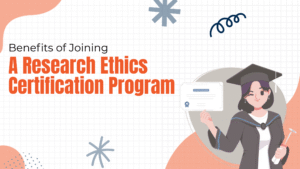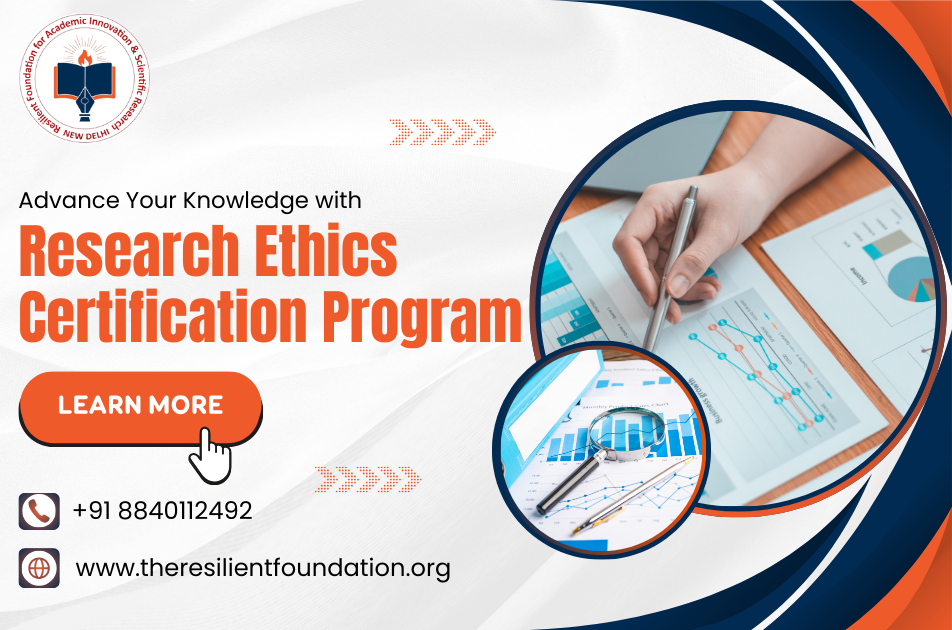In today’s fast-changing world of research, professionals need the right skills and knowledge to ensure their work follows strict ethical standards. That is why a research ethics certification plays such a key role. It not only helps you grow as a responsible researcher but also makes your work more credible and trustworthy. Because of that, more organisations and professionals are now turning to specialised learning programs that guide them in following the right principles in research. In addition, this certification gives you a strong foundation to apply ethical principles in real-world research. Along with this, it connects directly to concepts like bioethics training program, bioethics certification, research methodology, and ethical research practices.
What is a Research Ethics Certification Program?
A research ethics certification program is a structured learning course designed to teach the principles of ethics in research. It helps professionals understand how to apply the right methods and standards in their work. If you are still wondering what it includes, here are the key points:
- It introduces you to the core values of ethics in research, such as honesty and fairness.
- Explains how a bioethics training program ensures respect for human rights in scientific work.
- It gives practical knowledge about the rules and guidelines that govern research.
- Highlights how a bioethics certification improves career opportunities by showing your commitment to responsible research.
- It provides insights into research methodology, making your studies more systematic and reliable.
- Builds awareness about ethical research practices that protect both researchers and participants.
Key Areas Covered in Research Ethics Certification

When you enrol in a research ethics certification course, you learn about several important areas that shape ethical decision-making. Each area ensures that research is done responsibly and fairly. Some of the major areas include:
- Introduction to ethics: Understanding the meaning of ethics in research and why it matters.
- Human and animal rights: Learning how a bioethics training program ensures protection for all research participants.
- Confidentiality and privacy: Exploring how researchers should handle sensitive data with care.
- Plagiarism and originality: Knowing how a bioethics certification builds a culture of honesty in research.
- Research integrity: Focusing on how research methodology connects with transparent and reliable processes.
- Case studies: Studying real-world examples that show the importance of ethical research practices.
Benefits of Joining a Research Ethics Certification Program

There are many reasons to join a research ethics certification course. It not only enhances your professional knowledge but also boosts your credibility in your field. Some of the most valuable benefits include:
- Career growth: A bioethics training program makes you more employable and respected in academic and research communities.
- Better decision-making: With a bioethics certification, you can handle ethical challenges in research with confidence.
- Improved knowledge: You understand how research methodology works in practice, so your work is more systematic.
- Trust and respect: Following ethical research practices builds trust among participants, colleagues, and institutions.
- Global recognition: This program is accepted worldwide, so you can apply your knowledge anywhere.
Expert Opinion
Experts agree that earning a research ethics certification creates strong professionals who can handle challenges with confidence. They say a bioethics training program adds real value, a bioethics certification proves commitment, research methodology sharpens skills, and ethical research practices ensure lasting impact.
Who Should Enrol in a Research Ethics Certification Program?
Not everyone needs this certification, but if you belong to the groups below, it can transform your career. At Resilient Foundation, we offer structured and practical programs that fit your goals. Here are the groups that benefit the most:
- Students and researchers: If you want to start your journey with a research ethics certification, this program helps you build a solid base.
- Medical and healthcare workers: A bioethics training program guides you in maintaining dignity and respect while working with patients and participants.
- Academicians and teachers: A bioethics certification allows you to guide your students better in professional research.
- Social workers: If your work involves studies on communities, research methodology ensures you collect data responsibly.
At Resilient Foundation, we believe education should go beyond knowledge—it should build responsibility. Our programs in research ethics help learners gain both skills and values. Because of that, participants not only grow academically but also make a difference in society by conducting responsible and ethical research.

